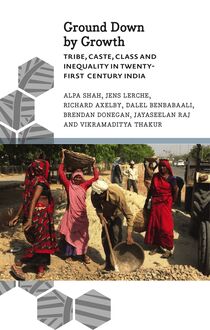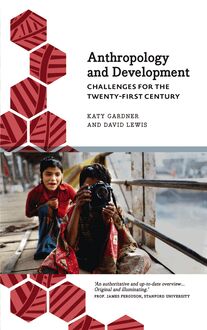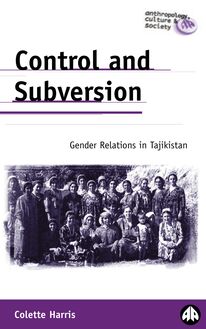A History of Anthropology , livre ebook
187
pages
English
Ebooks
2013
Vous pourrez modifier la taille du texte de cet ouvrage
Obtenez un accès à la bibliothèque pour le consulter en ligne En savoir plus
Découvre YouScribe et accède à tout notre catalogue !
Découvre YouScribe et accède à tout notre catalogue !
187
pages
English
Ebooks
2013
Vous pourrez modifier la taille du texte de cet ouvrage
Obtenez un accès à la bibliothèque pour le consulter en ligne En savoir plus
Publié par
Date de parution
10 mai 2013
Nombre de lectures
0
EAN13
9781849649193
Langue
English
Poids de l'ouvrage
1 Mo
The book provides an unparalleled account of theoretical developments in anthropology from the 1920s to the present, including functionalism, structuralism, hermeneutics, neo-Marxism and discourse analysis. There are brief biographies of major anthropologists and coverage of key debates including totemism, kinship and globalisation.
This essential text on anthropology is highly engaging, authoritative and suitable for students at all levels.
Series preface
Preface
1. Proto-Anthropology
Introduction
Herodotus and other Greeks
After Antiquity
The European Conquests and their Impact
Why All This is not Quite Anthropology Yet
The Enlightenment
Romanticism
2. Victorians, Germans and a Frenchman
Introduction
Evolutionism and Cultural History
Morgan
Marx
Bastian and the German Tradition
Tylor and Other Victorians
The Golden Bough and the Torres Expedition
German Diffusionism
The New Sociology
Durkheim
Weber
3. Four Founding Fathers
Introduction
The Founding Fathers and their Projects
Malinowski and the Trobriand Islanders
Radcliffe-Brown's Natural Science of Society
Boas and Historical Particularism
Mauss and the Total Social Prestation
Anthropology in 1930: Parallels and Divergences
4. Expansion and Institutionalisation
Introduction
A Marginal Discipline?
Oxford and LSE, Columbia and Chicago
The Dakar-Djibouti Expedition
Culture and Personality
Cultural History
Ethnolinguistics
The Chicago School
'Kinshipology'
Functionalism's Last Stand
Some British Outsiders
5. Forms of Change
Introduction
Neo-evolutionism and Cultural Ecology
Formalism and Substativism
Methodological Individualists at Cambridge
Role Analysis and System Theory
6. The Power of Symbols
Introduction
From Function to Meaning
Ethnoscience and Symbolic Anthropology
Geertz and Schneider
Levi-Strauss and Structuralism
Early Impact
The State of the Art in 1968
7. Questioning Authority
Introduction
The Return of Marx
Structural Marxism
The Not-Quite-Marxists
Political Economy and the Capitalist World System
Feminism and the Birth of Reflexive Fieldwork
Ethnicity
Practice Theory
The Sociobiology Debate and Samoa
8. The End of Modernism?
Introduction
The End of Modernism?
The Postcolonial World
A New Departure or a Return to Boas?
Other Positions
9. Global Networks
Introduction
Towards an International Anthropology?
Trends for the Future
Biology and Culture
Globalisation and the Production of Locality
Bibliography
Index
Publié par
Date de parution
10 mai 2013
EAN13
9781849649193
Langue
English
Poids de l'ouvrage
1 Mo
A History of Anthropology
Anthropology, Culture and Society
Series Editors:
Professor Vered Amit, Concordia University
and
Dr Jon P. Mitchell, University of Sussex
Published titles include:
Claiming Individuality:
The Cultural Politics of Distinction
E DITED BY V ERED A MIT AND N OEL D YCK
Community, Cosmopolitanism and the Problem of Human Commonality
V ERED A MIT AND N IGEL R APPORT
Home Spaces, Street Styles:
Contesting Power and Identity in a South African City
L ESLIE J. B ANK
In Foreign Fields:
The Politics and Experiences of Transnational Sport Migration
T HOMAS F. C ARTER
On the Game:
Women and Sex Work
S OPHIE D AY
Slave of Allah:
Zacarias Moussaoui vs the USA
K ATHERINE C. D ONAHUE
A World of Insecurity:
Anthropological Perspectives on Human Security
E DITED BY T HOMAS E RIKSEN , E LLEN B AL AND O SCAR S ALEMINK
A History of Anthropology Second Edition
T HOMAS H YLLAND E RIKSEN AND F INN S IVERT N IELSEN
Ethnicity and Nationalism:
Anthropological Perspectives Third Edition
T HOMAS H YLLAND E RIKSEN
Globalisation:
Studies in Anthropology
E DITED BY T HOMAS H YLLAND E RIKSEN
Small Places, Large Issues:
An Introduction to Social and Cultural Anthropology Third Edition
T HOMAS H YLLAND E RIKSEN
What Is Anthropology?
T HOMAS H YLLAND E RIKSEN
Discordant Development:
Global Capitalism and the Struggle for Connection in Bangladesh
K ATY G ARDNER
Anthropology, Development and the Post-Modern Challenge
K ATY G ARDNER AND D AVID L EWIS
Border Watch:
Cultures of Immigration, Detention and Control
A LEXANDRA H ALL
Corruption:
Anthropological Perspectives
E DITED BY D IETER H ALLER AND C RIS S HORE
Anthropology’s World:
Life in a Twenty-first Century Discipline
U LF H ANNERZ
Humans and Other Animals Cross-cultural Perspectives on Human–Animal Interactions
S AMANTHA H URN
Culture and Well-Being:
Anthropological Approaches to Freedom and Political Ethics
E DITED BY A LBERTO C ORSÍN J IMÉNEZ
State Formation:
Anthropological Perspectives
E DITED BY C HRISTIAN K ROHN -H ANSEN AND K NUT G. N USTAD
Cultures of Fear:
A Critical Reader
E DITED BY U LI L INKE AND D ANIELLE T AANA S MITH
Fair Trade and a Global Commodity:
Coffee in Costa Rica
P ETER L UETCHFORD
The Will of the Many:
How the Alterglobalisation Movement is Changing the Face of Democracy
M ARIANNE M AECKELBERGH
The Aid Effect:
Giving and Governing in International Development
E DITED BY D AVID M OSSE AND D AVID L EWIS
Cultivating Development:
An Ethnography of Aid Policy and Practice
D AVID M OSSE
Contesting Publics Feminism, Activism, Ethnography
L YNNE P HILLIPS AND S ALLY C OLE
Terror and Violence:
Imagination and the Unimaginable
E DITED BY A NDREW S TRATHERN , P AMELA J. S TEWART AND N EIL L. W HITEHEAD
Anthropology, Art and Cultural Production
M ARUŠKA S VAŠEK
Race and Ethnicity in Latin America Second Edition
P ETER W ADE
Race and Sex in Latin America
P ETER W ADE
The Capability of Places:
Methods for Modelling Community Response to Intrusion and Change
S ANDRA W ALLMAN
Anthropology at the Dawn of the Cold War:
The Influence of Foundations, McCarthyism and the CIA
E DITED BY D USTIN M. W AX
Learning Politics from Sivaram:
The Life and Death of a Revolutionary Tamil Journalist in Sri Lanka
M ARK P. W HITAKER
First published 2001 by Pluto Press. Second edition published 2013
345 Archway Road, London N6 5AA
www.plutobooks.com
Distributed in the United States of America exclusively by
Palgrave Macmillan, a division of St. Martin’s Press LLC,
175 Fifth Avenue, New York, NY 10010
Copyright © Thomas Hylland Eriksen and Finn Sivert Nielsen 2001, 2013
The right of Thomas Hylland Eriksen and Finn Sivert Nielsen to be identified as the authors of this work has been asserted by them in accordance with the Copyright, Designs and Patents Act 1988.
British Library Cataloguing in Publication Data
A catalogue record for this book is available from the British Library
ISBN 978 0 7453 3353 3 Hardback
ISBN 978 0 7453 3352 6 Paperback
ISBN 978 1 8496 4918 6 PDF eBook
ISBN 978 1 8496 4920 9 Kindle eBook
ISBN 978 1 8496 4919 3 EPUB eBook
Library of Congress Cataloging in Publication Data applied for
This book is printed on paper suitable for recycling and made from fully managed and sustained forest sources. Logging, pulping and manufacturing processes are expected to conform to the environmental standards of the country of origin.
10 9 8 7 6 5 4 3 2 1
Typeset from disk by Stanford DTP Services, Northampton, England
Simultaneously printed digitally by CPI Antony Rowe, Chippenham, UK and Edwards Bros in the United States of America
Contents
Series Preface
Preface to the Second Edition
Preface to the First Edition
1. Proto-Anthropology
Herodotus and other Greeks ; After Antiquity ; The European conquests and their impact ; Why all this is not quite anthropology yet ; The Enlightenment ; Romanticism
2. Victorians, Germans and a Frenchman
Evolutionism and cultural history ; Morgan ; Marx ; Bastian and the German tradition ; Tylor and other Victorians ; The Golden Bough and the Torres expedition ; German diffusionism ; The new sociology ; Durkheim ; Weber
3. Four Founding Fathers
The founding fathers and their projects ; Malinowski among the Trobriand Islanders ; Radcliffe-Brown and the ‘natural science of society’ ; Boas and historical particularism ; Mauss and the total social prestation ; Anthropology in 1930: parallels and divergences
4. Expansion and Institutionalisation
A marginal discipline? ; Oxford and the LSE, Columbia and Chicago ; The Dakar-Djibouti expedition ; Culture and personality ; Cultural history ; Ethnolinguistics ; The Chicago school ; ‘Kinshipology’ ; Functionalism’s last stand ; Some British outsiders
5. Forms of Change
Neo-evolutionism and cultural ecology ; Formalism and substantivism ; The Manchester school ; Methodological individualists at Cambridge ; Role analysis and system theory
6. The Power of Symbols
From function to meaning ; Ethnoscience and symbolic anthropology ; Geertz and Schneider ; Lévi-Strauss and structuralism ; Early impact ; The state of the art in 1968
7. Questioning Authority
The return of Marx ; Structural Marxism ; The not-quite-Marxists ; Political economy and the capitalist world system ; Feminism and the birth of reflexive fieldwork ; Ethnicity ; Practice theory ; The sociobiology debate and Samoa
8. The End of Modernism?
The end of modernism? ; The postcolonial world ; A new departure or a return to Boas? ; Other positions
9. Global Networks
Towards an international anthropology? ; Trends for the future ; Biology and culture ; Globalisation and the production of locality
Bibliography
Index
Series Preface
Anthropology is a discipline based upon in-depth ethnographic works that deal with wider theoretical issues in the context of particular, local conditions – to paraphrase an important volume from the series: large issues explored in small places. This series has a particular mission: to publish work that moves away from an old-style descriptive ethnography that is strongly area-studies oriented, and offer genuine theoretical arguments that are of interest to a much wider readership, but which are nevertheless located and grounded in solid ethnographic research. If anthropology is to argue itself a place in the contemporary intellectual world, then it must surely be through such research.
We start from the question: ‘What can this ethnographic material tell us about the bigger theoretical issues that concern the social sciences?’ rather than ‘What can these theoretical ideas tell us about the ethnographic context?’ Put this way round, such work becomes about large issues, set in a (relatively) small place, rather than detailed description of a small place for its own sake. As Clifford Geertz once said, ‘Anthropologists don’t study villages; they study in villages.’
By place, we mean not only geographical locale, but also other types of ‘place’ – within political, economic, religious or other social systems. We therefore publish work based on ethnography within political and religious movements, occupational or class groups, among youth, development agencies, and nationalist movements; but also work that is more thematically based – on kinship, landscape, the state, violence, corruption, the self. The series publishes four kinds of volume: ethnographic monographs; comparative texts; edited collections; and shorter, polemical essays.
We publish work from all traditions of anthropology, and all parts of the world, which combines theoretical debate with empirical evidence to demonstrate anthropology’s unique position in contemporary scholarship and the contemporary world.
Professor Vered Amit
Dr Jon P. Mitchell
Preface to the Second Edition
It would not be correct to claim that anthropology has changed dramatically in the twelve years that have passed since the publication of the first edition of this book. However, there are several reasons why we felt that a thorough revision and update was in order by now.
First, the non-metropolitan anthropologies – from Brazil to Russia, from Japan to India – were treated cursorily and somewhat superficially in the first edition. This has now, at least to the best of our abilities, been rectified. Recent scholarship on ‘other people’s anthropologies’ has been of great help here.
Second, there were a number of small errors, inaccuracies and ambiguities scattered around in the first edition. We cannot guarantee that they are all gone, but again, we have done our best.
Third, there have in fact been some slight changes or adjustments in the course that anthropology has been taking in the last few years. For example, the field of globalisation studies, an incipient and slightly naughty trend in the 1990s – naughty because it eschewed an assumed orthodoxy seein














